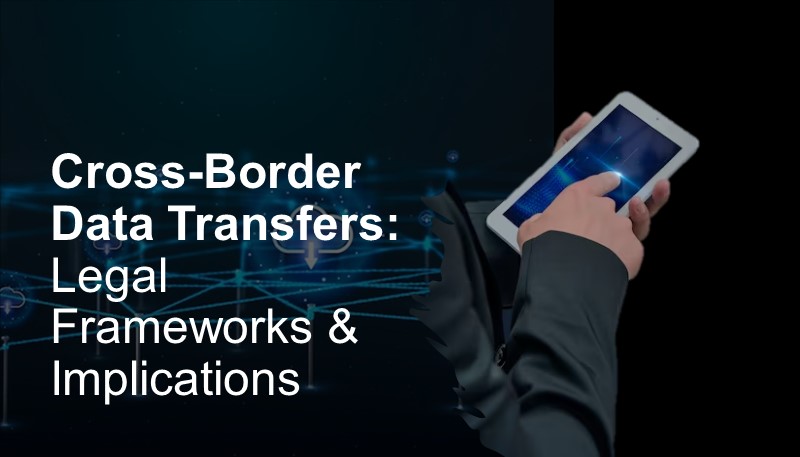Introduction
In today’s interconnected world, data has become the lifeblood of the digital economy, enabling businesses to thrive and societies to function more efficiently. However, as data flows seamlessly across borders, concerns about privacy, security, and jurisdictional challenges have arisen. This blog explores the legal frameworks and implications surrounding cross-border data transfers from India, shedding light on the complexities and considerations faced by businesses and individuals within the country.
Understanding Cross-Border Data Transfers in India
Cross-border data transfers in India refer to the movement of personal or sensitive information from India to foreign countries or vice versa. Such transfers occur in various contexts, including multinational corporations exchanging data within their global entities, Indian companies utilizing cloud-based services hosted overseas, and individuals accessing online services offered by foreign companies.
Legal Frameworks Governing Cross-Border Data Transfers in India
India has formulated laws and regulations to address the challenges associated with cross-border data transfers. The primary legal frameworks include:
- The Information Technology (Reasonable Security Practices and Procedures and Sensitive Personal Data or Information) Rules, 2011: Under this rule, Indian companies collecting, processing, or transferring sensitive personal data are required to obtain prior consent from the data subjects. Moreover, they must ensure the data is transferred only to countries that offer an adequate level of data protection.
- General Data Protection Regulation (GDPR) Compliance: In cases where Indian entities deal with data of European Union citizens, they must adhere to the GDPR’s stringent requirements. GDPR permits data transfers from the EU to India under specific conditions, emphasizing data protection and individual rights.
- Data Protection Bill: India is in the process of enacting a comprehensive data protection law to replace the existing rules. The proposed Data Protection Bill aims to regulate cross-border data transfers more effectively and establish a Data Protection Authority to oversee compliance.
Implications and Challenges for Businesses and Individuals in India
Cross-border data transfers can have several implications for businesses and individuals in India:
- Data Privacy and Security: When data crosses borders, it becomes subject to foreign laws, potentially leading to concerns about data privacy and security.
- Compliance Costs: Indian companies engaging in cross-border data transfers may incur additional expenses to ensure compliance with different jurisdictions’ data protection laws.
- Jurisdictional Complexity: Determining which country’s laws apply to data transfers can be complex, leading to legal uncertainties and potential conflicts.
- Government Access to Data: In some cases, foreign governments may request access to data stored in their jurisdictions, creating challenges for Indian businesses in safeguarding sensitive information.
- Impact on Technology and Innovation: Strict data localization requirements may hinder technology development and innovation in India if access to global data becomes limited.
Mitigating the Risks and Ensuring Compliance
To address the challenges associated with cross-border data transfers, businesses and individuals in India can take proactive steps:
- Compliance Assessment: Conduct a comprehensive assessment of the data being transferred, the countries involved, and the legal requirements governing such transfers.
- Data Minimization: Minimize the cross-border transfer of personal data to reduce exposure to risks while ensuring business operations continue efficiently.
- Encryption and Data Security: Implement robust data security measures, such as encryption and access controls, to safeguard data during transfers and storage.
- Third-Party Due Diligence: Before engaging third-party service providers for data storage or processing, ensure they comply with relevant data protection laws and have secure data handling practices.
- Implementation of legal risk management software or compliance management tool in India: To address the challenges posed by cross-border data transfers and ensure seamless compliance, businesses in India can leverage advanced legal risk management software or compliance management tools. These technologies offer comprehensive solutions for monitoring and managing cross-border data transfers, enabling organizations to proactively assess and mitigate potential legal risks, maintain data privacy, and adhere to relevant regulatory requirements.
Conclusion
Cross-border data transfers play a pivotal role in India’s digital economy but come with legal complexities and implications for businesses and individuals. Understanding and adhering to the relevant legal frameworks are vital for protecting data privacy, ensuring compliance, and fostering trust among customers. By adopting robust data protection practices and staying informed about evolving regulations, organizations and individuals in India can navigate the intricacies of cross-border data transfers successfully and leverage the power of data-driven growth in the digital era alike.
At Lexplosion, we understand the critical importance of navigating the ever-evolving legal landscape, especially concerning cross-border data transfers. Our cutting-edge legal risk management software solutions have been instrumental in supporting businesses across India in staying compliant and mitigating legal risks effectively. Our comprehensive suite of solutions enable organizations to streamline their data governance processes, ensure adherence to the relevant legal frameworks, and bolster data security and privacy measures during cross-border data transfers. With a focus on transparency and customer-centricity, Lexplosion has been at the forefront of empowering businesses with innovative legal technology to navigate complexities, seize growth opportunities, and build trust among their stakeholders. Partner with us today, and let our expertise and technology-driven approach help you confidently navigate the challenges of cross-border data transfers and safeguard your organization’s data and reputation. Together, we can secure a stronger future in the digital era.
Written by: Soham Chaudhury
Co-authored by: Koushik Sinha, Saikat Mondal
Disclaimer
All material included in this blog is for informational purposes only and does not purport to be or constitute legal or other advice. This blog should not be used as a substitute for specific legal advice. Professional legal advice should be obtained before taking or refraining from an action as a result of the contents of this blog. We exclude any liability (including without limitation that for negligence or for any damages of any kind) for the content of this blog. The views and opinions expressed in this blog are those of the author/(s) alone and do not necessarily reflect the official position of Lexplosion Solutions. We make no representations, warranties or undertakings about any of the information, content or materials provided in this blog (including, without limitation, any as to quality, accuracy, completeness or reliability). All the contents of this blog, including the design, text, graphics, their selection and arrangement are the intellectual property of Lexplosion Solutions Private Limited and/or its licensors.
ALL RIGHTS RESERVED, and all moral rights are asserted and reserved.





